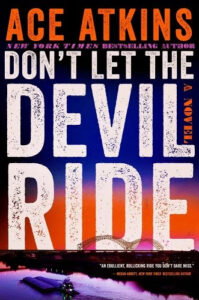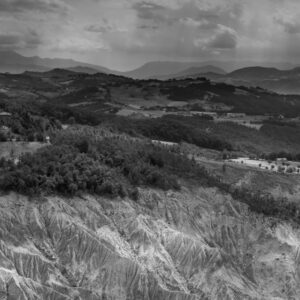More than two decades ago, the idea hit me. The kind of novel that I’d wanted to write, been trying to write for years, was equally influenced and informed by the early blues music I loved as it was by the hardboiled masters I idolized. I realized the direct connection between Hammett and Chandler and Son House and Robert Johnson. The spare poetry, sense of doom, and sudden violence crossed the page as surely as it came from my speakers. I knew if I could blend the two into a story, I really had something. All that time listening to Vocalion records and reading ragged old Dell paperbacks would finally pay off. Six months after my epiphany, I had finished a manuscript that became my first published novel, Crossroad Blues. I sold it almost immediately to St. Martin’s Press and haven’t slowed down since.
The influence of music on my writing has never stopped, although it often changed styles and genres. For my second novel, I turned to the more polished Chicago blues style of the 1950s with Muddy Waters, Howlin’ Wolf, and the great Otis Rush. “I Can’t Quit You Baby (but have to put you down for a while)” was not only the historical backbeat of what became Leavin’ Trunk Blues, but also offered a tone and a feel that I wanted to bring to the novel. I listened to a lot of piano master Otis Spann, music filled with isolation and longing, to tell a story that stretched from the Mississippi Delta to the South Side of Chicago. I would start off each writing session listening to the specific era I was writing about, particularly drawn to the forgotten Cobra label where Otis Rush and Buddy Guy recorded their first singles.
As I was drawn deeper into the world of noir fiction, I was also poring over the liner notes from those classic recordings. Cobra’s owner/producer had been murdered and the crime never solved. Harmonica virtuoso Little Walter had been beaten to death in an alley after a heated craps game. The music, historical backbeat, the hardboiled/noir voice all became one.
My musical journey would take me to the heyday of Southern Soul at Stax Records in Memphis for Dark End of the Street. Another brilliant American music moment, also filled with darkness and crime. The book began in Memphis in 1968, with some of the story influenced by the true story of the unsolved murder of Booker T & the MGs’ drummer, Al Jackson. That took me to the blossoming Southern rap scene in New Orleans led by Master P, Mystikal, Juvenile and Lil’ Wayne for Dirty South. I started the novel with an epigraph of both Lil Wayne and Little Walter, two artists from the same city saying much the same thing, only in a different era and with different styles.
The book, a violent noir set in New Orleans, is one of my favorites and stylistically and tonally very different from where I began with Crossroad Blues.
All of these artists, from 100-year-old blues greats, to the soul masters, and Southern rappers from the early 2000s, taught me a hell of a lot about writing. I feel I learned as much from Willie Dixon or David Porter about crafting a scene and imagery as I did from Raymond Chandler or Elmore Leonard. The opening lyrics of Dixon’s “Wang Dang Doodle”—about a rogue’s gallery of killers and cutthroats meeting up for a party—was definitely a passage Dutch would’ve admired. Tell Automatic Slim, tell Razor Totin’ Jim . . .
But while my appreciation and beginnings definitely started with American Black music, I leaned in heavy to the Cuban rhythms of Perez Prado and Beny Moré for my 1950s Florida crime epic, White Shadow. And the simple, elegant brilliance of my fellow Alabamian Hank Williams for Wicked City. Hank’s songs held a special place for me. A man deeply influenced by blues, he often parked his Cadillac across from my mother’s childhood home and drank Jack Daniel’s with my grandfather. (My mother recalls my grandfather coming home one night and talking about how Hank had another hit on his hands, beating out a drum beat on the dash of his car for a story about a wooden Indian chief named “Kaw-Liga.”)
From the start of my eleven-book Quinn Colson series, I knew I wanted to create a character and a town that felt like a Johnny Cash song. That was the genesis of everything. The driving beat and blossoming threat of inescapable violence came of “Don’t take your guns to town, son” became The Ranger. Every book that followed echoed the heartbreak and darkness I heard in Waylon Jennings and Charley Pride. I think if I were to do a word search in my Quinn books, Charley Pride and Waylon would come up hundreds of times. Those artists were my warm-up music as I headed into Tibbehah County, rounding the curves of those country roads and heading on into the county seat of Jericho. I couldn’t write a scene without their influence.
I think those winding roads in Mississippi, listening to classic country and blues, ultimately led me back to Memphis, where I am now with my 30th novel, Don’t Let the Devil Ride. I’ve been writing about Memphis—a place I feel is the epicenter of Americana—going back to my very first book. There are few, if any, Quinn books that don’t have scenes in the city, and my book Infamous is about the city’s most famous outlaw, George “Machine Gun” Kelly.
For a long, long while I wanted to write an all-out Memphis story that wasn’t necessarily about music but felt like it had a true Memphis soundtrack. That included my favorite label, Stax (the subject of terrific new HBO documentary), and wonderful songs that came out of Royal Studios and Hi Records. I had the good fortune to spend some time with legendary producer Willie Mitchell some years ago. A gracious and gregarious man, he regaled me with tales of all the talent who’d recorded there. Ann Peebles. Syl Johnson. Otis Clay. All of this while he was waiting for Al Green to show up for his recording sessions, hours late. Some of his swagger and coolness absolutely shows up in Don’t Let the Devil Ride’s hero, Porter Hayes.
Don’t Let the Devil Ride is peppered with a soundtrack of Memphis’s past—from Elvis to Otis. The hero of the novel, legendary private eye Porter Hayes, is named for the dynamic song writing team of David Porter and Isaac Hayes. Those two men were the heart of Stax, writing and producing such hits as “Soul Man,” “B-A-B-Y,” and “When Something is Wrong With My Baby” and too many others to list. But Porter Hayes’ connection to Stax goes far deeper than just his name. His energy, outlook and history is deeply tied to the Memphis label. He’s a Black man who came of age in the turbulent 1960s of Memphis, and as a young patrol officer, witnessed the assassination of Martin Luther King Jr. His late wife Genevieve was a member of one of Stax’s most famous girl groups.
My musical journey seemed to come full circle recently when David Porter showed up at one of my first book signings to buy a copy for himself and one for the late Isaac Hayes’ grandson. (His incredible appearance was facilitated by Memphis’s Live at 9 host Kontji Anthony, who had interviewed me earlier that day.) I was finally able to thank him for not only the enjoyment of all his hits but the inspiration he gave me as a writer. Without David Porter, there would be no Porter Hayes. Without the sound, the feel of Stax, Don’t Let the Devil Ride wouldn’t have a soul.
It was a special moment for me as a writer. And we got to share a laugh when I told him about a pivotal moment in the novel. When Hayes’ client Addison McKellar is threatened by a one-armed mercenary, Porter Hayes gets to reply as only David Porter and Isaac Hayes could, “Hold On. I’m Comin’.”
***


















